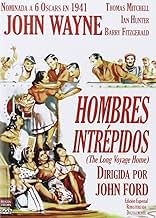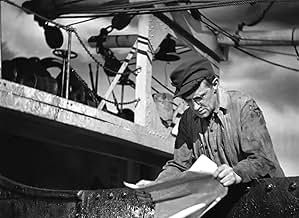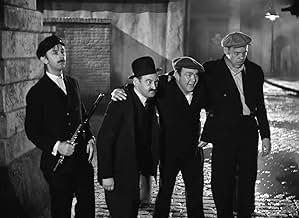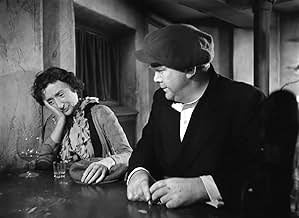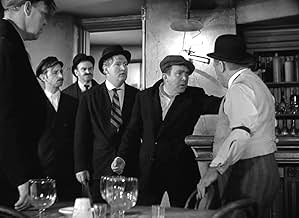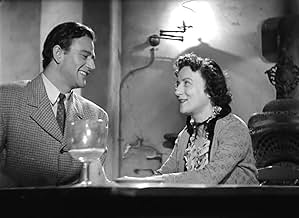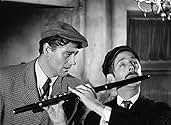IMDb RATING
6.9/10
5.1K
YOUR RATING
A merchant ship's crew tries to survive the loneliness of the sea and the coming of war.A merchant ship's crew tries to survive the loneliness of the sea and the coming of war.A merchant ship's crew tries to survive the loneliness of the sea and the coming of war.
- Nominated for 6 Oscars
- 3 wins & 7 nominations total
Wilfrid Lawson
- Captain
- (as Wilfred Lawson)
Joe Sawyer
- Davis
- (as Joseph Sawyer)
Constant Franke
- Norway
- (as Constant Frenke)
David Hillary Hughes
- Scotty
- (as David Hughes)
- Director
- Writers
- All cast & crew
- Production, box office & more at IMDbPro
Storyline
Did you know
- TriviaBarry Fitzgerald, who plays the character of Cocky, and Arthur Shields, who played Donkeyman, were brothers in real life. They also appeared together in director John Ford's The Quiet Man (1952).
- GoofsAt the beginning of the film, when Driscoll sneaks back to the ship, he jumps from a rowboat into the water and climbs up the anchor chain. The next time onscreen, he appears dry from head to toe.
- ConnectionsFeatured in Film Preview: Episode #1.2 (1966)
- SoundtracksBlow the Man Down
(uncredited)
Traditional
Played during the opening credits
Sung often by crewmen
Sung a cappella by J.M. Kerrigan
Variations played as part of the score
Featured review
I was expecting this film about a tramp steamer with a cargo of high explosives to be a wartime drama along the lines of "San Demetrio"; in fact, the war is pretty peripheral. Even when the ship does come under attack, somewhere around the middle of the picture, she apparently escapes unscathed via means unspecified (did the enemy simply run out of bombs after missing with all of them?) It's really a story about life on the lower decks, with the officers making distant appearances and the wartime background intruding from time to time, but with the main focus on the relationships among the crew.
According to the credits, it was adapted from a set of "sea plays" by Eugene O'Neill, which accounts for the very episodic feel of the film. It's not really a complete story; it's a set of individual isolated incidents, some of which are never really explained (all the signalling with torches, for instance, which is apparently not anything to do with undercover spies -- I actually assumed there were two ships in the opening scene, one being the tramp steamer and the other a British naval vessel!) On the other hand, it did succeed in several places in making me care about the characters; I was convinced that Smitty was being falsely accused, and desperate by the end for Ole to escape successfully from seaboard life as his shipmates are determined that he should do, despite the heavy foreshadowing otherwise.
The film was billed as "John Wayne in Eugene O'Neill's The Long Voyage Home", but that's presumably a retrospective attempt to cash in on Wayne's name; the lead actors are Thomas Mitchell as the burly Irishman Driscoll, and Ian Hunter as the middle-class Englishman who is the odd one out among his cheery companions. John Wayne plays Ole, the simple Swedish farmboy whose role is largely passive and monosyllabic, though he gets a good scene where he talks nostalgically about his home during the final drunken bar-crawl.
There are no very great surprises here, and the pace is quite slow -- extremely slow at the beginning, which is presumably intended to indicate the heat and tedium of a tropical night. I can see these individual 'episodes' working better in the original format as one-act plays, each with its definitive ending, than as an attempt at one continuing story. I didn't find the film quite successful (not nearly so much so as the English production "San Demetrio, London"), but on the other hand, it's not entirely mediocre -- and it's not as gung-ho as an actual war film would probably have been. (The shadowy role of the war is explained, in retrospect, by the fact that the source material was written twenty years earlier!)
I'd probably rate it 7/10: worth taping from TV, not worth paying for :-p
According to the credits, it was adapted from a set of "sea plays" by Eugene O'Neill, which accounts for the very episodic feel of the film. It's not really a complete story; it's a set of individual isolated incidents, some of which are never really explained (all the signalling with torches, for instance, which is apparently not anything to do with undercover spies -- I actually assumed there were two ships in the opening scene, one being the tramp steamer and the other a British naval vessel!) On the other hand, it did succeed in several places in making me care about the characters; I was convinced that Smitty was being falsely accused, and desperate by the end for Ole to escape successfully from seaboard life as his shipmates are determined that he should do, despite the heavy foreshadowing otherwise.
The film was billed as "John Wayne in Eugene O'Neill's The Long Voyage Home", but that's presumably a retrospective attempt to cash in on Wayne's name; the lead actors are Thomas Mitchell as the burly Irishman Driscoll, and Ian Hunter as the middle-class Englishman who is the odd one out among his cheery companions. John Wayne plays Ole, the simple Swedish farmboy whose role is largely passive and monosyllabic, though he gets a good scene where he talks nostalgically about his home during the final drunken bar-crawl.
There are no very great surprises here, and the pace is quite slow -- extremely slow at the beginning, which is presumably intended to indicate the heat and tedium of a tropical night. I can see these individual 'episodes' working better in the original format as one-act plays, each with its definitive ending, than as an attempt at one continuing story. I didn't find the film quite successful (not nearly so much so as the English production "San Demetrio, London"), but on the other hand, it's not entirely mediocre -- and it's not as gung-ho as an actual war film would probably have been. (The shadowy role of the war is explained, in retrospect, by the fact that the source material was written twenty years earlier!)
I'd probably rate it 7/10: worth taping from TV, not worth paying for :-p
- Igenlode Wordsmith
- Jun 6, 2020
- Permalink
- How long is The Long Voyage Home?Powered by Alexa
Details
- Release date
- Country of origin
- Languages
- Also known as
- Eugene O'Neill's The Long Voyage Home
- Filming locations
- Los Angeles Harbor, Wilmington, Los Angeles, California, USA(scenes on S.S. Munami)
- Production companies
- See more company credits at IMDbPro
Box office
- Budget
- $682,495 (estimated)
- Runtime1 hour 45 minutes
- Color
- Aspect ratio
- 1.37 : 1
Contribute to this page
Suggest an edit or add missing content


